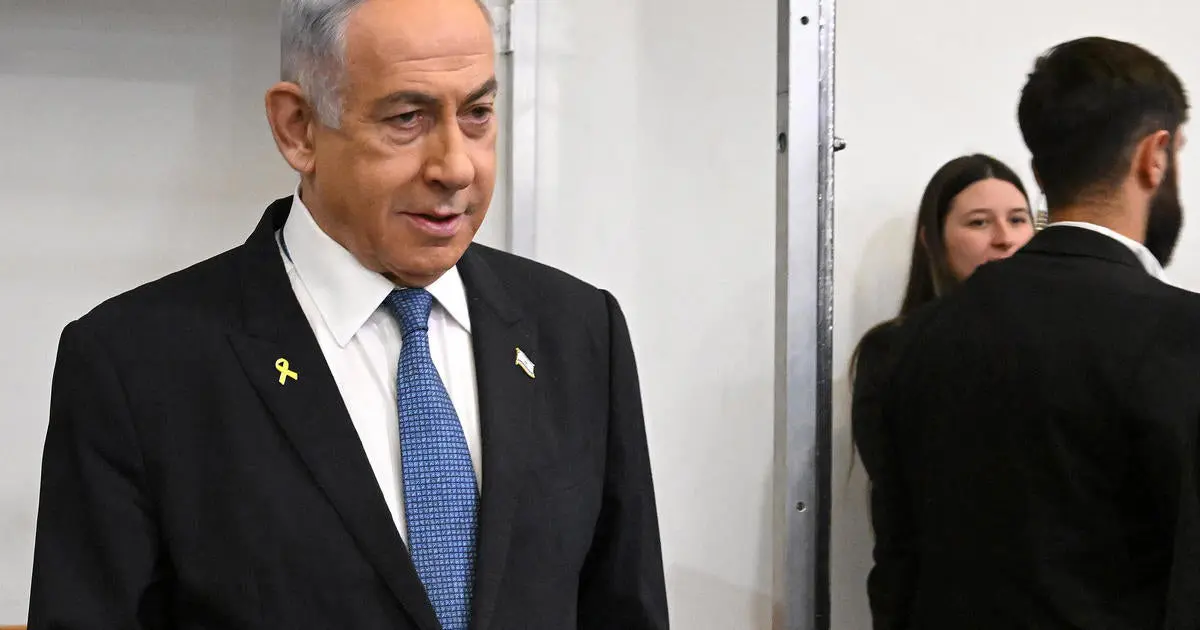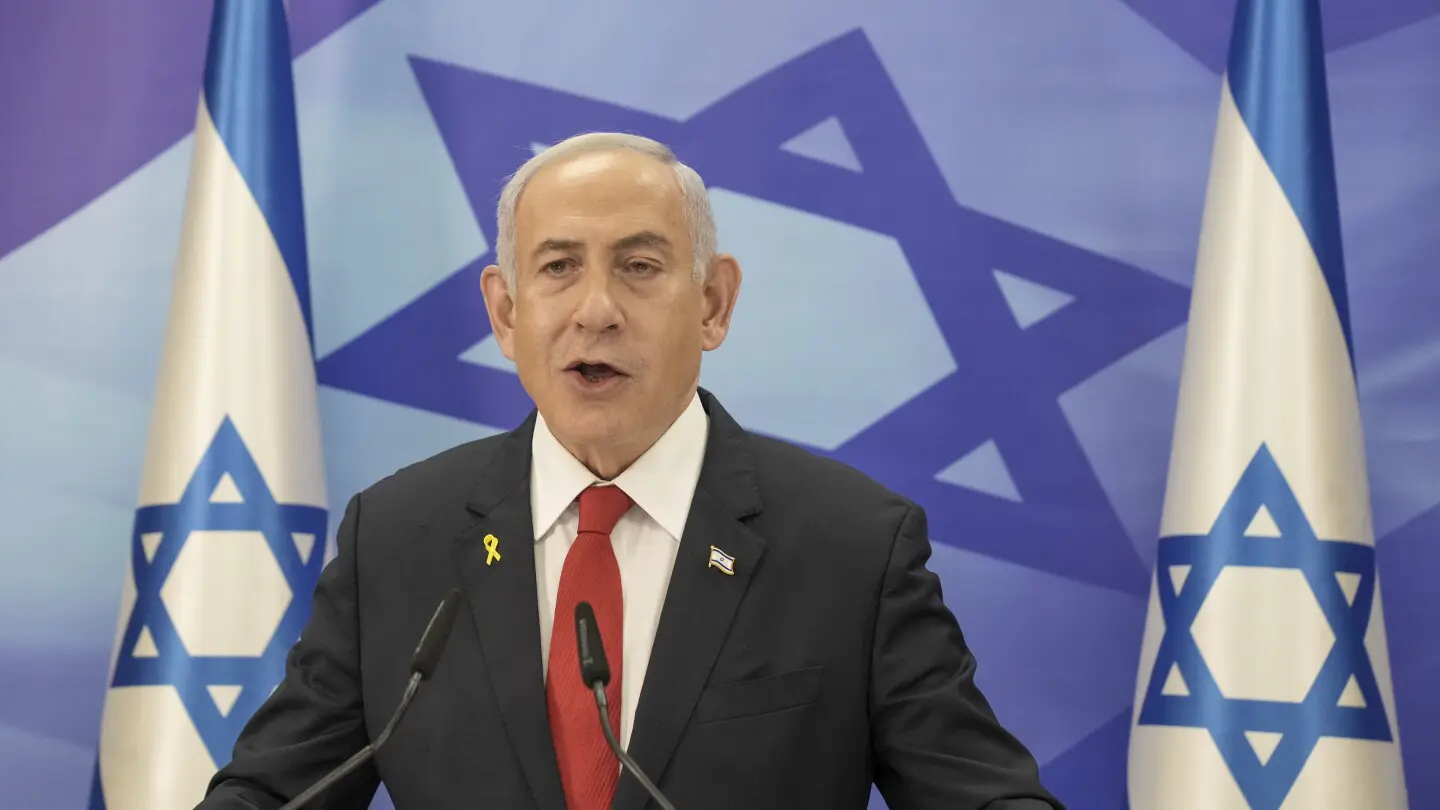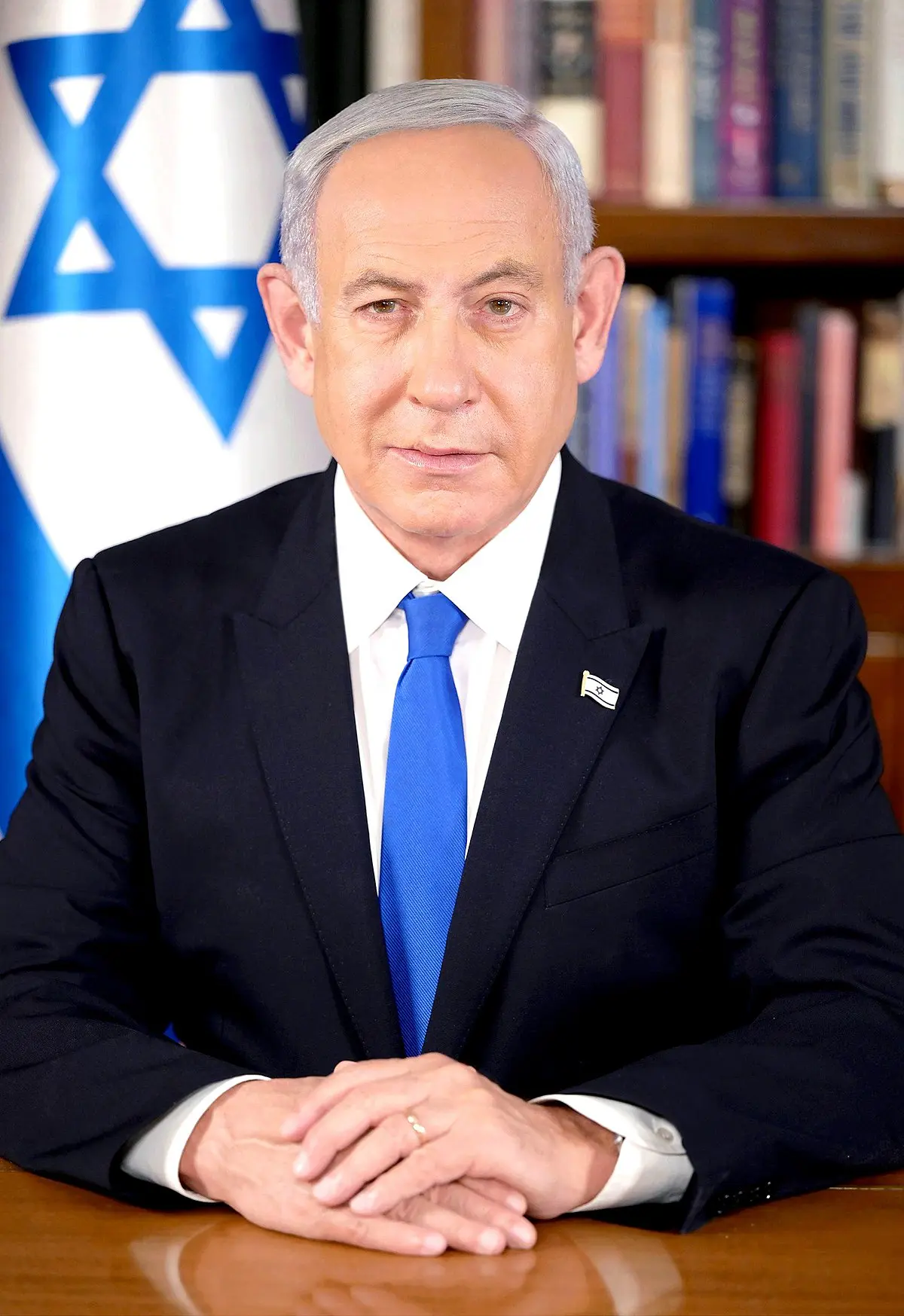Israel Prime Minister Benjamin Netanyahu undergoes successful prostate surgery, hospital says

Israeli Prime Minister Benjamin Netanyahu successfully underwent surgery to have his prostate removed, hospital officials said Sunday.
The 75-year-old leader, who has had a series of health issues in recent years, was diagnosed with a urinary tract infection resulting from a benign prostate enlargement, his office said.
Jerusalem's Hadassah Medical Center announced late Sunday that the procedure had been "completed successfully." Justice Minister Yariv Levin, a close ally, served as acting prime minister during the operation. Netanyahu is expected to remain hospitalized for several days.
Netanyahu is among older world leaders including President Biden, 82, President-elect Donald Trump, 79, and Pope Francis, 88, who have come under scrutiny for their age and health issues. He has gone to great lengths to bolster his public image as a healthy, energetic leader. During his trial for alleged corruption this month, he boasted about working 18-hour days.
Such a grueling workload could take a toll on his well-being as he deals with multiple crises including the war in Gaza. However, Netanyahu insists he is in excellent health.
That image was shattered last year when it was revealed he had a heart condition. In July last year, doctors implanted a pacemaker after a medical scare.
Also last year, Netanyahu was rushed to the hospital for what doctors said was likely dehydration. He stayed overnight.
In March, Netanyahu underwent a hernia surgery, during which he was under full anesthesia and unconscious. Levin served as acting prime minister during that operation.
The procedure on Sunday came as Israel is the center of major global events that are shifting the Middle East.
Israel has been at war against Hamas militants in the Gaza Strip for nearly 15 months after the Oct. 7, 2023 attacks in southern Israel that killed around 1,200 people and abducted some 250 others. Some 100 Israelis remain captive in Gaza and around a third are believed to be dead.
The war has killed more than 45,400 Palestinians and wounded more than 108,000 others according to the Hamas-controlled Health Ministry in Gaza. Its count does not distinguish between civilians and combatants.
Earlier this month, Netanyahu took the stand in his long-running trial for alleged corruption. This week, Israel's attorney general ordered police to open an investigation into Netanyahu's wife on suspicion of harassing political opponents and a witness in the corruption trial.
The Associated Press contributed to this report.
Israeli hospital says Netanyahu has undergone successful prostate surgery

TEL AVIV, Israel (AP) — Israeli Prime Minister Benjamin Netanyahu underwent successful surgery Sunday to have his prostate removed, hospital officials said, a procedure that came as he manages multiple crises including the war in Gaza and his trial for alleged corruption.
Netanyahu, who has had a series of health issues in recent years, has gone to great lengths to bolster a public image of himself as a healthy, energetic leader. During his trial this month, he boasted about working 18-hour days, accompanied by a cigar. But as Israel’s longest-serving leader, such a grueling workload over a total of 17 years in power could take a toll on his well-being.
Netanyahu, 75, is among older world leaders including U.S. President Joe Biden, 82, President-elect Donald Trump, 78, Brazil’s President Luiz Inácio Lula da Silva, 79, and Pope Francis, 88, who have come under scrutiny for their age and health issues.
Netanyahu’s latest condition is common in older men, but the procedure has had some fallout. The judges overseeing his trial accepted a request from his lawyer on Sunday to call off three days of testimony scheduled this week. The lawyer, Amit Hadad, had argued that Netanyahu would be fully sedated for the procedure and hospitalized for “a number of days.”
Dr. Ofer Gofrit, head of the urology department at Jerusalem’s Hadassah Medical Center, said in a video statement late Sunday that the procedure had gone well and “there was no fear” of cancer or malignancy. “We only hope for the best,” he said.
In a statement, Netanyahu thanked his doctors. His office said he was “fully alert” and was taken to an underground recovery unit fortified against potential missile attacks. Netanyahu was expected to remain in the hospital for several days of observation.
Justice Minister Yariv Levin, a close ally, served as acting prime minister during the operation.
With so much at stake, Netanyahu’s health in wartime is a concern for both Israelis and the wider world.
As Israel’s leader, Netanyahu is at the center of major global events that are shifting the Middle East. With the dizzying pace of the past 14 months, being incapacitated for even a few hours can be risky.
Netanyahu will be in the hospital at a time when international mediators are pushing Israel and Hamas to reach a ceasefire in Gaza and as fighting between Israel and Yemen’s Iran-backed Houthi rebels intensifies.
Prostate issues are common and in many cases easily treatable. Still, the procedure puts a dent in Netanyahu’s image of vigor at a time when he would want to project strength more than ever, both to an Israeli audience navigating constant threats as well as to Israel’s enemies looking to expose its weaknesses.
Netanyahu insists he is in excellent health. His office releases footage of him touring war zones in full protective gear flanked by military officers, or meeting with defense officials on windswept hilltops in youthful dark shades and puffer jackets.
But that image was shattered last year when Netanyahu’s doctors revealed that he had a heart condition, a problem that he had apparently long known about but concealed from the public.
A week after a fainting spell, Netanyahu was fitted with a pacemaker to control his heartbeat. Only then did staff at the Sheba Medical Center reveal that Netanyahu has for years experienced a condition that can cause irregular heartbeats.
The revelation came as Netanyahu was dealing with massive anti-government protests. The news about a chronic heart problem stoked further anger and distrust during extreme political polarization in Israel.
Last year, Netanyahu was rushed to the hospital for what doctors said likely was dehydration. He stayed overnight, prompting his weekly Cabinet meeting to be delayed.
Earlier this year, Netanyahu underwent hernia surgery, during which he was under full anesthesia and unconscious. Levin served as acting prime minister during the operation.
According to Netanyahu’s office, the Israeli leader was diagnosed with a urinary tract infection on Wednesday stemming from a benign enlargement of his prostate. The infection was treated successfully with antibiotics, but doctors said the surgery was needed in any case.
Complications from prostate enlargement are common in men in their 70s and 80s, Dr. Shay Golan, head of the oncology urology service at Israel’s Rabin Medical Center, told Israeli Army Radio. Golan spoke in general terms and was not involved in Netanyahu’s care or treatment.
He said an enlarged prostate can block proper emptying of the bladder, leading to a build-up of urine that can lead to an infection or other complications. After medicinal treatment, doctors can recommend a procedure to remove the prostate to prevent future blockages, Golan said.
In Netanyahu’s case, because the prostate is not cancerous, Golan said doctors were likely performing an endoscopic surgery, carried out by inserting small instruments into a body cavity, rather than making surgical cuts in the abdomen to reach the prostate.
The procedure lasts about an hour, Golan said, and recovery is quick. He said that aside from catheter use for one to three days after the procedure, patients can return to normal activity without significant limitations.
AP correspondent Isaac Scharf contributed reporting.
Israel's attorney general orders investigation into claims Netanyahu's wife harassed opponents

Israel's attorney general has ordered police to open an investigation into Prime Minister Benjamin Netanyahu's wife on suspicion of harassing political opponents and a witness in the Israeli leader's corruption trial.
The Israeli Justice Ministry made the announcement in a terse message late Thursday, saying the investigation would focus on the findings of a recent report by the "Uvda" investigative program into Sara Netanyahu.
The program uncovered a trove of WhatsApp messages in which Mrs. Netanyahu appears to instruct a former aide to organize protests against political opponents and to intimidate Hadas Klein, a key witness in the trial.
The announcement did not mention Mrs. Netanyahu by name, and the Justice Ministry declined further comment.
But in a video released earlier Thursday, Netanyahu listed what he said were the many kind and charitable acts by his wife and blasted the Uvda report as "lies."
"My opponents on the left and in the media found a new-old target. They mercilessly attack my wife, Sara," he said. He called the program "false propaganda, nasty propaganda that brings up lies from the darkness."
It was the latest in a long line of legal troubles for the Netanyahus — highlighted by the prime minister's ongoing corruption trial. The pair have also had a rocky relationship with the Israeli media.
Netanyahu is charged with fraud, breach of trust and accepting bribes in a series of cases alleging he exchanged favors with powerful media moguls and wealthy associates. Netanyahu denies the charges and says he is the victim of a "witch hunt" by overzealous prosecutors, police and the media.
The report obtained correspondence between Sara Netanyahu and Hanni Bleiweiss, a former aide to the prime minister who died of cancer last year. The messages indicated that Sara Netanyahu encouraged police to crack down violently on anti-government protesters and ordered Bleiweiss to organize protests against her husband's critics. She also told Bleiweiss to get activists in Netanyahu's Likud party to publish attacks on Klein.
Klein is an aide to billionaire Hollywood mogul Arnon Milchan and has testified in the corruption case about her role in delivering tens of thousands of dollars worth of champagne, cigars and gifts to Netanyahu for her boss.
According to the report, Sara Netanyahu mistreated Bleiweiss, prompting her to share the messages with a reporter shortly before her death.
Sara Netanyahu has been accused of abusive behavior toward her personal staff before. This, together with accusations of excessive spending and using public money for her own extravagant personal tastes, has earned her an image as being out of touch with everyday Israelis. In 2019, she was fined for misusing state funds.
National Security Minister Itamar Ben-Gvir, who oversees police and has repeatedly said Attorney General Gali Baharav Miara should be fired over a series of grievances against her, said the latest announcement was another reason for her to be dismissed.
"Someone who politically persecutes government ministers and their families cannot continue to serve as the attorney general," he said.
And Justice Minister Yariv Levin, another Netanyahu ally and critic of Baharav Miara, accused her of focusing on "television gossip."
"Selective enforcement is a crime!" he said in a statement.

